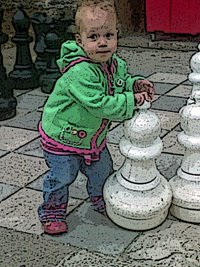Personal academic highlights of the last week included listening to stuff about time and games, and an MMO paper I enjoyed, despite my refusal to get with the C21st and go grind for myself.
I was presenting on games and temporality myself (can't seem to find the abstracts for any of the papers online, but I'll edit when I stop being stupid) only to find out (as if I shouldn’t have already known) that others are doing great work in the area. Actually I needed to get some things off my chest about the difference between academic and industry understandings of time, so I suppose it was the least academic presentation of my career to date. Then again, I have been known to skirt dangerously close to a rant before. I was therefore a little nervous seeing some of the scholars I have most personal time for in the audience when I was due to speak. I had thought timing (8.30 am last day) would have meant a more limited audience. Ho ho.
DiGRA is certainly good for reminding you that you work inside a talented community and not in isolation, and earlier in the conference I had listened to the work of José Zagal and Michael Mateas ('Temporal Frames: A Unifying Framework for the Analysis of Game Temporality') and Michael Nitsche ('Mapping Time in Video Games')and it rang all sorts of bells that would seem to connect it usefully with my own work. Now, I am aware that this is problematic, as I might be listening tuned to ‘me’ (that strange internal channel where everything connects with my own research and writing) while they are speaking about something only tangentially related. But there is enough of a connection in the attention to time and games to make me think I need to read the full papers properly. All that I heard was certainly good, useful scholarship.
The MMO paper was David Myers' contribution ('Self and selfishness in online social play'), which cheered me up, oddly, in its calm analysis (from what I understood as a visitor from distant planet Singleplayer) of PVP play that might be viewed as griefing by some.
And the keynote from the Japanese 'Gaming Gods', as they were characterised by the Conference Chair, was delightful. I would do a disservice to them to claim to be able to paraphrase their comments on the heady days of yore, but I think they managed to say both that videogames need to come out of an understanding of games and toys and leisure practice going back into the mists of time, and that they need to be understood in relation to other entertainment media. I am prepared to bow to the words of the gods there.
I can imagine I missed loads (and have just thoughtlessly excluded words of absolute genius uttered by others where I wasn't listening properly) and I wasn't able to go to everything I wanted, but I tried...
Saturday, 29 September 2007
Subscribe to:
Post Comments (Atom)

No comments:
Post a Comment